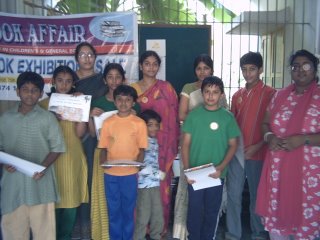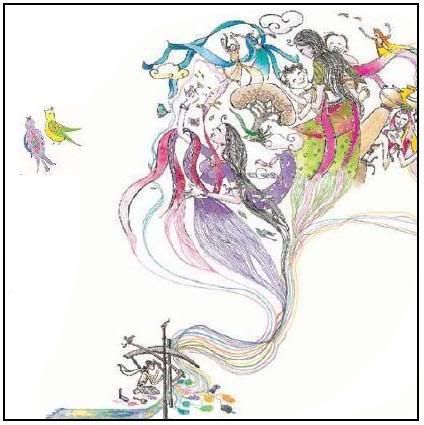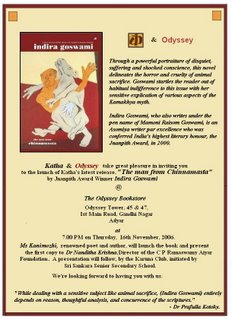(Metroplus - Delhi, The Hindu, 16 November)
 WORDSMITH'S WISDOM DON'T Judge Maitreyi Pushpa's book by its cover
WORDSMITH'S WISDOM DON'T Judge Maitreyi Pushpa's book by its cover Maitreyi spoke about "Alma Kabutari" to AMRITA TALWAR.
Nobel laureate and author Orhan Pamuk came into limelight when his stories were translated from Turkish to English. Now, people across the world can read his novels. Similarly, India with its diversity in culture, language and religion, has some great stories and storytellers. It is important that the thoughts of such writers are read by the largest possible numbers.
Keeping with the trend of translations, Katha Publishing House has brought out a double treat for literary diehards - Maitreyi Pushpa's SAARC Literary Award-winning novel "Alma Kabutari" translated from Hindi to English and U.N. Singh's poem, "Second Person Singular", translated from Maithili to English.
"Alma Kabutari" is an account of Alma, a young girl from the marginalised kabutara community. It is the story of her evolution from victim to survivor to a tenacious rebel. Identified as a criminal tribe during the colonial times, kabutaras have dealt with social and sexual subjugation by the upper caste. They are not only poor but do not possess any land or water resources, are roofless, and the society has completely shunned them.
Real person
But Alma is the revolution. Educated on her father's insistence, Alma finds that literacy brings her authority and confidence to sustain her through life's upheavals and tragedies. She is the nerve centre of her village. She leaves home and connects with society and creates an identity for herself.
Maitreyi Pushpa, who has written consistently about rural politics and is an activist of sorts for the underprivileged and exploited tribes, through her book has presented to the world, the condition of Kabutaras. "My book's protagonist is not just a character but a real person. I met her in Khill, my village in Jhansi, and was mesmerised by her beauty and touched by her plight," says Pushpa.
So how did she connect with the tribe? "These people either stayed in mountains or made a banyan tree their home. As a child, I wanted to go and help them but was always stopped by my mother. But opportunity came in the form of my brother Shovaram, who was at that time interacting with the women of the tribe." Alma is his daughter-in-law.
Kabutaras were blamed for the sins, which they never committed. "When the tribe realised that without stealing they are being blamed for it, they started robbing places and rich landlords - attacking the rice granaries and other agricultural produces. They used to be caught and jailed for life. The men spent most of the time in jails and their young wives were left behind," says Pushpa.
According to Pushpa, the kabutara women are very beautiful. "The women, to make an income sell hooch made of mahua and gur. Since men spend most of their time in jail, the women to ensure breeding of their future generations indulge in illicit sex with the upper caste."
But they have no recognition in the society. "Two kids were studying and I asked one of them, why they weren't going to school and the younger one said that the upper caste children release dogs on them."
On translating it from Hindi to English, she says, "My Hindi novel could only reach selective audience but I wanted to share the plight of these people globally and translating it into English was the perfect medium."
Translated work of SAARC award winner released
By Indo Asian News ServiceNew Delhi, Nov 2 (IANS)
Two English translations, including 'Alma Kabutari', the SAARC literary award winning Hindi novel by Maitreyi Pushpa, have been released by Katha.
Pushpa's novel and 'Second Person Singular', a collection of original poems in Maithili by Udaya Narayana Singh, were released here by noted Hindi scholar Namwar Singh Wednesday evening.In 'Alma Kabutari', translated by Raji Narasimhan, Pushpa delineates the old Kabutari tradition of sexual slavery of the Kajja tribe. The onus of breaking this vicious circle of subjugation and securing a human status for the Kabutaris falls upon young Alma.
It is an engrossing tale of both her extraordinary achievement and also a window to the lives of marginalised tribes.Pushpa, who usually writes on women's issues, said after the launch: 'Women have come a long way from their position of subordination to carving out a niche for themselves. 'They have had to bear harassment and torture to bring about this change. There are hopes resting on the new generation that they will be able to take up the challenges of the day and take this movement forward.'Pushpa won the SAARC award in 2001.'Second Person Singular' presents the strange counterpoints that one gets from an involvement with language.
The authors read excerpts from their books and interacted with the audience.
More Links @
Publishers: Katha
Cover Design: Geeta Dharmarajan
Cover Painting: Paresh Maity
ISBN 81-87649-23-2 [PB]
Price: Rs 350 [In the Indian subcontinent]






